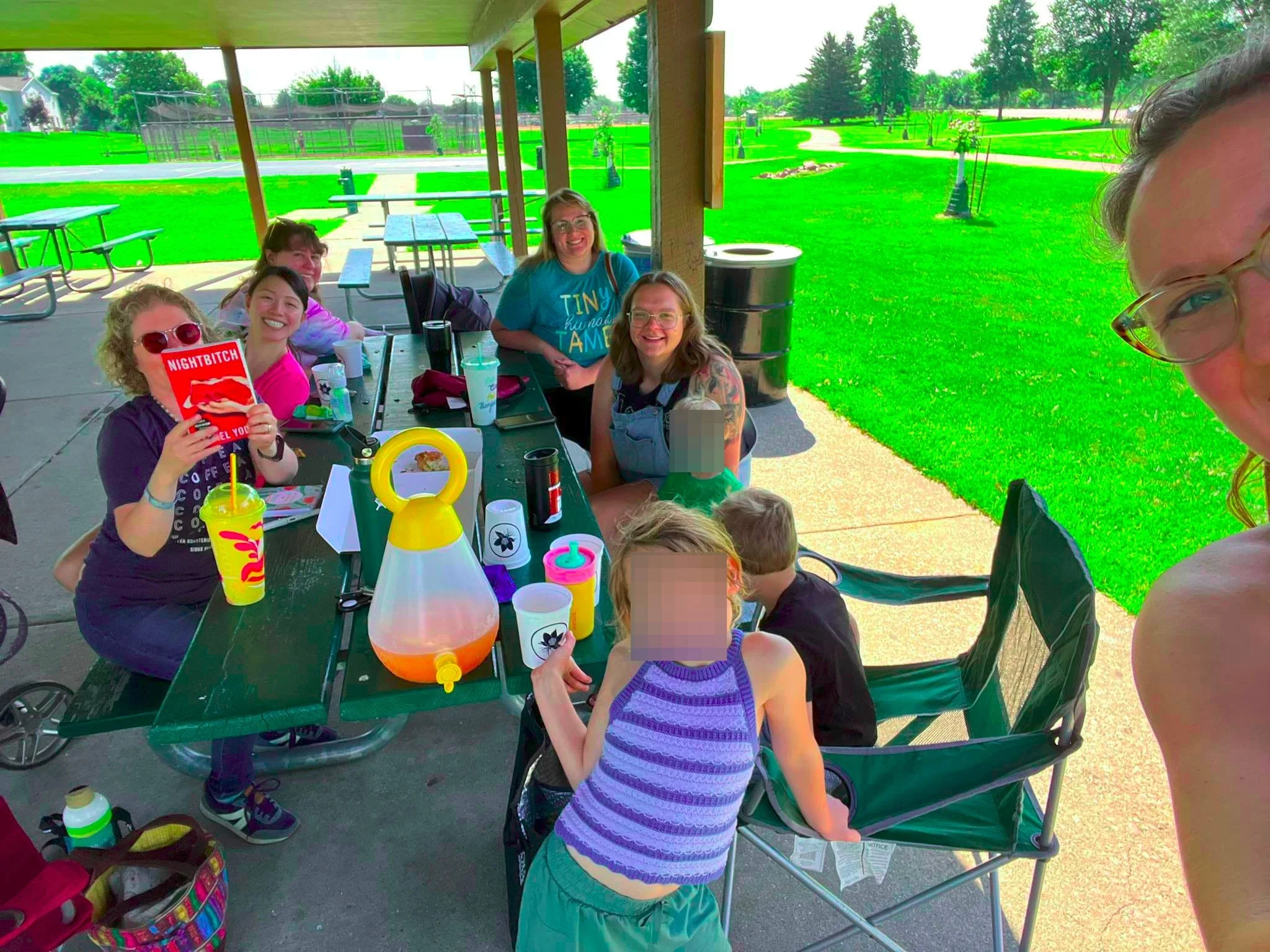The Book Club
/Transitions has started a book club! Check out the most recent book review, written post meet-up from a past client and writer, Lacey Louwagie.
My Reading Life: Nightbitch by Rachel Yoder
"You need to have your time to be wild to be better at domesticity."
Repost from Substack and written by : LACEY LOUWAGIE
When I was in my twenties and years away from becoming a mother myself, a coworker who had just had a baby told me this about nursing: “It really reminds you that underneath it all, we’re just animals.”
A mom at yesterday’s Book Club discussion admitted to “growling” once when her baby bit her nipple. (Related, my aunt reports that my sister also “growled” as a baby while nursing if anyone came too our mom.)
My first baby was born in the summer. We took him home, reeling. We returned to the same house, but everything had changed. We had a window air conditioner in our bedroom and we holed up in there for days, closing the door to keep the cool air in, intermittently sleeping and nursing and gulping glasses of water and wolfing down protein balls my mom had made us. The room smelled of sweat and breast milk and pee and baby poop. The sheets were always rumpled. Time ceased to have much meaning. Sometimes daylight came through the windows during the nursing and eating and sleeping and crying. Sometimes darkness surrounded us. And I remember feeling like that room was our den, that my husband, my son, and I were wild things hidden away from the world — wolves or foxes or bears. Certainly not humans. This was not the way humans lived.
Nightbitch by Rachel Yoder explores the transformation of a character known only as The Mother into Nightbitch, a dog, nominally a domesticated animal that still ripples with wildness and instinct under the surface. The book begins with the Mother growing stagnant and resentful of her life at home with her two-year-old son. Her husband travels for work throughout the week, the two-year-old sleeps in her bed each night and takes hours to drift off, and the Mother’s belief that she doesn’t want friends who are just “mom friends” keeps her isolated. This is where her transformation into Nightbitch, a dog who runs wild through the street, cracks the necks of rabbits between her teeth, and frolics through the dog park and the woods with her son begins.
Does the Mother actually transform, or is Nightbitch a product of sleep-deprivation and hallucination? Is Nightbitch just a metaphor for the wildness beneath the surface in women, which perhaps surges more than ever during early motherhood just as the world tells them they must be good and stay home? As the world, much like it does to dogs, proclaims them “cute” and “sweet” even though they’ve recently traversed the world between life and death in the birth experience?
At the first meeting of the Transitions Book Club, the women gathered weren’t particularly interested in exploring whether the Mother’s transformation into Nightbitch had “actually” happened. Instead, nearly everyone gathered — those who had first children just a couple months old and those whose children were old enough to become de facto “supervisors” on the playground where toddlers played nearby — said they’d found a lot to relate to in Nightbitch. The restlessness. The reliance on instinct. The rage. The utter transformation and reintegration motherhood demands.
We talked about whether we were “cat people” or “dog people” (and about the harrowing scene that hits cat people especially hard.) We talked about the performative aspects of motherhood, identity shifts, being expected to separate our “mother” selves and our “worker” selves, trying to explain the “mental load” of motherhood to partners who don’t experience it directly despite their best intentions. And sure, we were talking about the book, but we were also talking about us, and it was exactly the sort of discussion I dreamed could happen when the book club idea was percolating.
As we were getting ready to leave, another “cat mom” and I swapped stories about our indoor/outdoor cats. We talked about how we’d noticed that letting the cats go outside to roam and hunt and smell nature made them so much more calm and — this is key — patient with the kids when they were in the house again. We agreed that the improvement in their mental wellbeing was worth the slightly increased risk of them encountering danger by being outdoors. I said, “It’s like, they have to have their time to be wild to be good at domesticity.”
Kelsie said, “And that pretty much sums it up, doesn’t it?”
Mark Your Calendars! Our next book club meet-up will be held
Monday, August 11, 9 am
Dunham Park, 1301 S Marion Rd.
You can subscribe and read more from Lacey Louwagie at https://substack.com/@laceylouwagie



